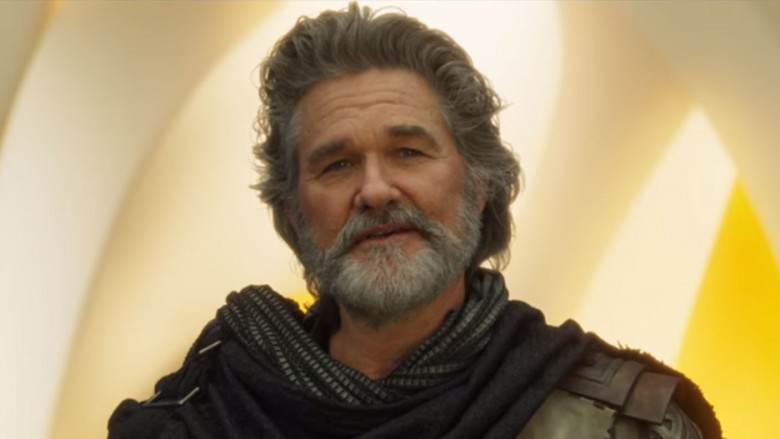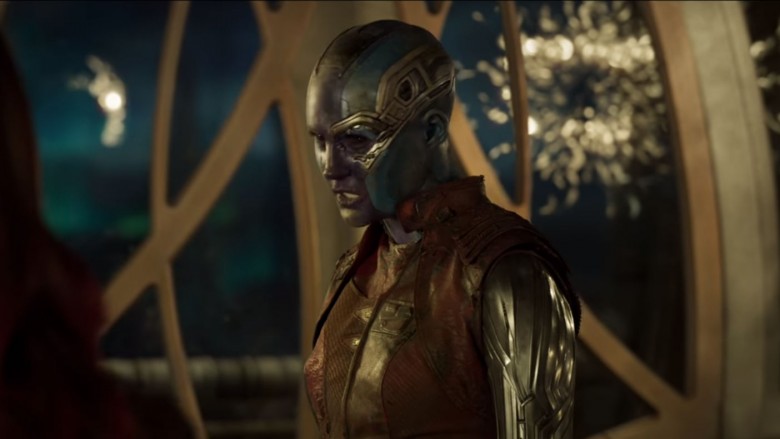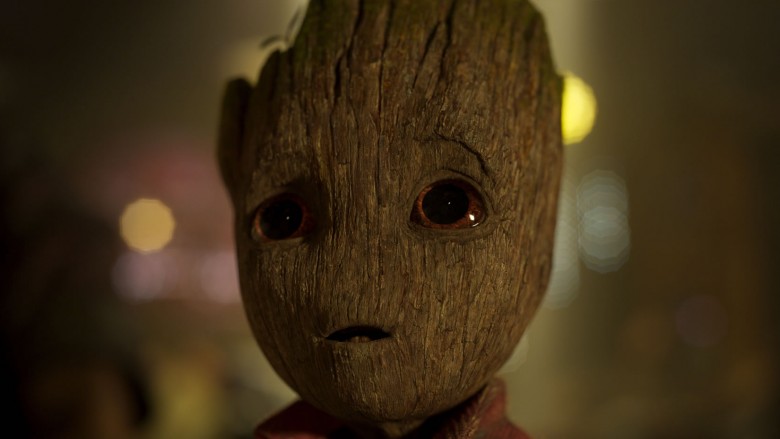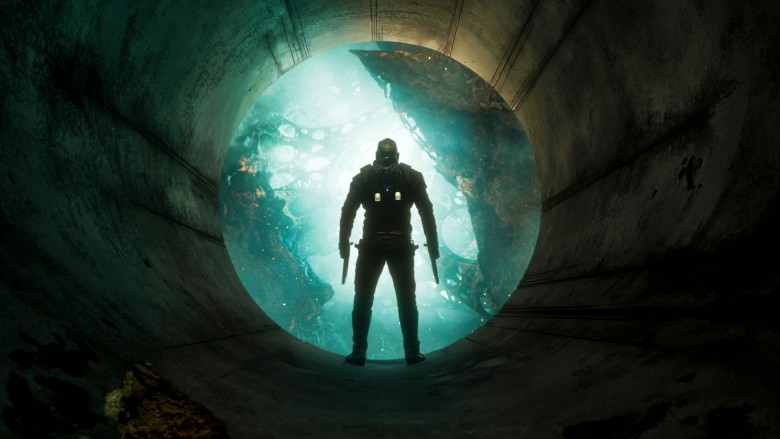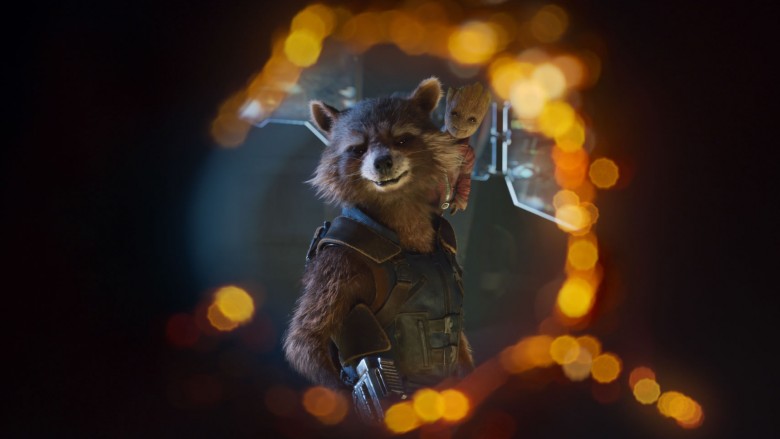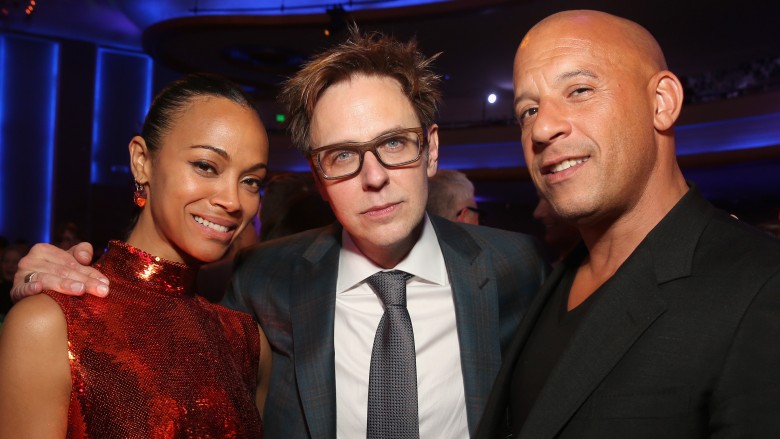The Ending Of Guardians Of The Galaxy 2 Explained
With the release of Guardians of the Galaxy Vol. 2, Marvel Studios has cemented its ability to take pretty much any random character in its vast publishing history and turn it into a blockbuster event. While it's not surprising that the second movie starring the Guardians was a hit, the movie's end did raise some interesting questions—both within the Marvel Cinematic Universe, as well as our own, much more boring, terrifying reality. What kinds of questions? These, dummy!
And, obviously, before we get into the real nitty-gritty, just remember: there are obviously spoilers ahead.
Ego on Earth
When Star-Lord's dad, Ego the Living Planet, enacted his scheme to take over the universe with big, blobby versions of himself, we got a glimpse of total chaos erupting in Missouri on Earth. What we didn't see, however, was the response of any of Earth's many, many superpowered people. Captain America, Iron Man, the Vision—none of the Avengers were anywhere to be found. Even Ant-Man couldn't apparently be bothered to put in an appearance. Unless he was there but was just, like, too small for us to see...
Anyway, let's get back on topic. The lack of a superheroic response on Earth was conspicuous by its absence. So when, if ever, will we follow up on the giant blob-splosion that occurred in Missouri as a result of Quills' crappy dad? Probably not in Thor: Ragnarok, which seems to take place almost exclusively away from Earth. Will Peter Parker flip past news of the disaster while he's watching TV in Spider-Man: Homecoming? We know that the Guardians of the Galaxy will have some sort of presence in the upcoming Avengers: Infinity War, so we may have our first hints at how the spacefaring heroes could find a way to get involved with events on Earth. And while we're on that subject...
Nebula on the hunt
By the end of the film, Gamora's sister Nebula is essentially a member of the Guardians, even if no one really likes her very much. But she still leaves to punish Thanos for putting her through hell her entire life. Actress Karen Gillan has already confirmed that she'll appear in Infinity War, so she must be colliding with Thanos one way or another once that movie debuts in 2018. That's another potential way for the Guardians to get mixed up with the rest of Earth's mightiest heroes. And when the Guardians do show up, they may be joined by...
Grumpy Groot
We saw the team taking a parental role with Baby Groot throughout the movie, with each taking turns to hug the little wooden boy at the end of the film. But then during one of the credits scenes, we see a surly teenage Groot playing video games and giving Star-Lord a hard time. Does that mean we'll have the regular, adult-sized Groot battling alongside Doctor Strange and Black Panther? Are we going to be subjected to an entire movie of puberty-stricken Groot? And on that note: when the first Iron Man movie came out in 2008, did anyone ever think there was even a remote possibility of seeing Groot, Doctor Strange, and Black Panther fighting together in a major Hollywood blockbuster? We live in amazing times.
Star-Lord's status
We'd had hints that Star-Lord had some pretty heavy-duty DNA back in the first Guardians of the Galaxy. There have been plenty of little ones, but the biggie was when he held onto the Infinity Stone to defeat Ronan the Accuser and somehow didn't explode into a million star-bits. Ego made it sound like the only thing keeping him immortal was the living planet's glowing, brainy core. But is that, y'know ... true?
Ego said that none of his other children had managed to retain their Celestial powers except for Peter. So that means Ego would have no idea how the powers of one of his children would actually work after his own death, right? Moreover, why would Peter lose his powers just because his deadbeat dad melted into space sand? If you get your dad's blue eyes, they don't fall out of your head after he kicks the bucket. It's entirely possible that Quill is still every bit the Star-Lord he was before Ego died.
On the other hand, if Ego is right, that opens up a whole different can of space-worms. Peter Quill has spent his whole life being, well, him. But if he's relied on his Celestial powers to get by in life up to this point, how will the sudden loss of those powers affect him going forward?
Romance?
By the end of the movie, we saw Gamora finally hint that she may have the same feelings for Star-Lord that he has for her. But beyond that, where the relationship between these two characters goes is anybody's guess. Conflict drives stories, and, as Peter pointed out when he referenced Sam and Diane on Cheers, having the couple get together is usually where the story—and the audience's interest in said relationship—ends. Don't be surprised to see that there's actually trouble in paradise between the two when they next appear. And maybe someone else could come into the picture and throw a monkey wrench into the relationship. Like, say, Starfox, the legendary space Lothario and younger brother to a certain purple-faced creep named Thanos. And while we're on the subject of romance...
No heroes necessary
In many ways, the Guardians of the Galaxy sequel confirms what we already knew from the first movie, not to mention Ant-Man: Marvel Studios doesn't need to rely on the traditional superhero formula to make great movies. In fact, this movie was probably one of the least superheroic outings the studio has released since the franchise started. Sure, the gang saves the galaxy by being heroic, but this movie had much more in common with Ghostbusters than Avengers.
And that's the thing. Marvel Studios has access to just about every character in the Marvel Comics library—excepting the ones that have already been farmed out to 20th Century Fox and Sony, but that's another story. The point is that Marvel's published a whole lot of comic books over the years, including cowboy comics, romance comics, and even cowboy romance comics back in the day. Marvel Studios simply needs to keep making good movies to be successful. It doesn't matter if the characters they choose are recognizable or not. Before Guardians of the Galaxy, who'd ever heard of Drax the Destroyer or Gamora or Ronan the Accuser, except for the geeks way in the back of the comic shop?
If Marvel wants to tap new genres featuring even more obscure characters, there's ample proof that it can do so without too much risk. And doing new, interesting things with big-budget movies means audiences will have more choice. That's a win.
Filmmakers making films
On that same note, both Guardians of the Galaxy movies were very much the product of writer-director James Gunn. We'll probably never know for sure how much or how little input Marvel Studios had on the script and final cut, but these are two very unique, very weird, very fun movies. Just as Marvel Studios can branch out into different territory when it comes to the kinds of movies it releases, it seems as though the studio is trusting its filmmakers to deliver the goods in whatever form they think is best. No studio will be totally hands-off with its summer blockbusters, but Gunn's two Marvel movies seem to indicate that the studio may have more trust in its directors than it ever has before. Fans definitely had reason for concern when director Edgar Wright left the Ant-Man production in 2014 due to creative differences. But as time goes on, that incident seems more like a fluke than anything to truly worry about. When it comes to Marvel movies, they'll probably be pretty good, no matter who's sitting in the director's chair. Fans—and Disney's shareholders—can apparently take that to the bank.

